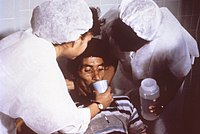
Photo from wikipedia
Drought is one of the main abiotic stresses, which affects plant growth, development, and crop yield. Plant response to drought implies carbon allocation to sink organs and sugar partitioning between… Click to show full abstract
Drought is one of the main abiotic stresses, which affects plant growth, development, and crop yield. Plant response to drought implies carbon allocation to sink organs and sugar partitioning between different cell compartments, and thereby requires the involvement of sugar transporters (SUTs). Among them, the early response to dehydration six-like (ESL), with 19 members in Arabidopsis thaliana, form the largest subfamily of monosaccharide transporters (MSTs) still poorly characterized. A common feature of these genes is their involvement in plant response to abiotic stresses, including water deficit. In this context, we carried out morphological and physiological phenotyping of A. thaliana plants grown under well-watered (WW) and water-deprived (WD) conditions, together with the expression profiling of 17 AtESL genes in rosette leaves. The drought responsiveness of 12 ESL genes, 4 upregulated and 8 downregulated, was correlated to different water statuses of rosette leaves. The differential expression of each of the tandem duplicated AtESL genes in response to water stress is in favor of their plausible functional diversity. Furthermore, transfer DNA (T-DNA) insertional mutants for each of the four upregulated ESLs in response to water deprivation were identified and characterized under WW and WD conditions. To gain insights into global sugar exchanges between vacuole and cytosol under water deficit, the gene expression of other vacuolar SUTs and invertases (AtTMT, AtSUC, AtSWEET, and AtβFRUCT) was analyzed and discussed.
Journal Title: Frontiers in Plant Science
Year Published: 2021
Link to full text (if available)
Share on Social Media: Sign Up to like & get
recommendations!